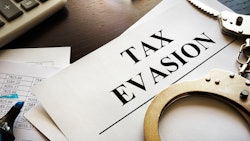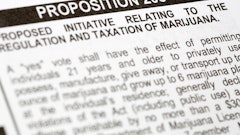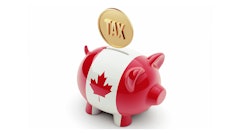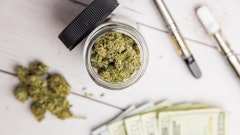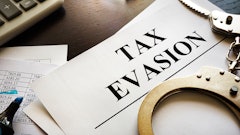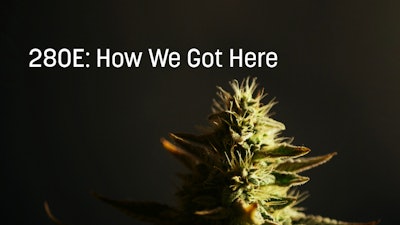
Cannabis is a plant that has been used medicinally and recreationally for thousands of years. During the past decade, through both education and state legalization, the cannabis stigma has waned in the United States. More than 40 states and four U.S. territories have legalized medical or adult-use cannabis consumption. As a result, Brightfield Group estimates that U.S. cannabis sales (both medical and adult use) will reach nearly $32 billion by the end of 2023.
Nevertheless, the federal government considers the state-legal production and sale of cannabis “unlawful drug trafficking” under the Controlled Substances Act. As a result, cannabis businesses must adhere to Tax Code IRC Section 280E. Under this provision, a person whose trade or business “consists” of “trafficking” in a Schedule I or II controlled substance may not take any deductions or credits against its gross income. Most income taxation occurs on “net income,” i.e., receipts less ordinary and necessary business expenses. However, Section 280E disallows these business-expense deductions. One can thus have a huge tax liability, despite operating at a loss.
At the end of August, the U.S. Department of Health and Human Services (HHS) confirmed it had sent a recommendation to the Drug Enforcement Administration (DEA) to reschedule cannabis. First reported by Bloomberg, the media organization said that HHS recommended that cannabis be designated a Schedule III substance, which would have many ramifications, including eliminating the 280E burden, as it only applies to Schedule I and II drugs. The DEA, which is reviewing the recommendation, has the final say on whether cannabis is rescheduled.
Should cannabis be rescheduled, many wonder if there would be any retroactivity to the rescheduling.
But how did this happen in the first place? Selling something that requires a state license and huge regulatory oversight – taxed as unlawful drug trafficking? To comprehend this dichotomy, one has to understand how we got here.
When Tea Was Contraband
Taxation of contraband for the purpose of law enforcement is not new. However, it has proven to be not-so successful either. Section 280E is the latest of a string of these tax prohibitions of contraband.
The first experiment of note within the U.S. was the colonial taxation of Dutch Tea by the British Crown. By 1760, the Colonists enjoyed a robust trade relationship with the Dutch – especially trade in Dutch Tea. The British saw this colonial relationship as a loss to its revenue base. As a result, Parliament amended the Navigation Acts, a series of laws that restricted trade in Great Britain’s favor, giving the British East India Company near monopoly on international trade. This made Dutch Tea contraband and required colonists to purchase British Tea through the East India Company. Parliament also taxed the merchants and possessors of Dutch Tea at a high rate. The Colonists refused to comply with the contraband laws and began to smuggle or “traffic” Dutch Tea into the Colonies.
The British Revenue Agents sought to enforce the Dutch Tea contraband through an early form of subpoenas, which allowed the revenue agents to search homes and businesses by force, confiscate the Dutch Tea, assess the contraband tax, arrest the merchants, and turn the evidence of the trafficking over to authorities for prosecution.
In 1761, 63 merchants challenged the power of the revenue agents. However, the merchants lost, and the revenue agents continued to enforce the contraband tax.
The British enforcement of Dutch Tea contraband tax prompted the “Boston Tea Party” and the American Revolution. The Fourth and Fifth Amendments to the U.S. Bill of Rights are a direct result of the excesses of British enforcement of contraband tax.
RELATED: Boston … ‘280E THC’ Party? MariMed Takes it Back to 1773
Prohibition and Taxation of Alcohol
For a century-and-a-half, the United States federal government avoided the route of the British revenue agents – but times changed.
By the early 1900s, the Temperance Movement had gained momentum. Likewise, there was opposition to opiates and cocaine. In 1914, Congress adopted the Harrison Narcotic Act restricting prescriptions and general access to opiates and cocaine.
In 1919, Congress ratified the Eighteenth Amendment outlawing the transportation and sale of alcoholic beverages. Along with this “prohibition” came a tax on a new illegal substance – alcohol.
Prior to prohibition, Federal revenues derived from liquor amounted to $6.3 billion per year in today’s dollars – primarily in excise taxes. With prohibition, alcohol excise taxes disappeared.
However, along with the Eighteenth Amendment, the federal government enacted the Volstead Act. The Department of Treasury enforced the Act, assessing a $1,000 fine/tax per every unlawful alcohol trafficking transaction. The result was a huge taxation failure.
Not only did the federal government lose the excise tax revenue, but the cost of enforcing the unlawful trafficking tax was more than the revenue collected. Ultimately, Congress repealed Prohibition in the Twenty-first Amendment, effectively voiding the Volstead Act. Federal taxation receipts returned to the pre-prohibition levels.
Next Contraband – Cannabis
However, beginning in the 20th century, cannabis came under scrutiny, much like alcohol. Some believe that the movement started as a result of “yellow journalism” by Hearst Newspapers sensationalizing the dangers of “Marihuana.” For example, on Feb. 27, 1930, the San Francisco Examiner ran a story, "Mother Sacrifices Children, Home, Reputation for Dope."
Despite the impending disaster of Prohibition, the federal government turned its sights to cannabis. The Department of Treasury founded the Federal Bureau of Narcotics in 1930. Harry Jacob Anslinger, the Bureau’s first director, focused on the prohibition of cannabis rather than opiates and cocaine. He coordinated state legislation criminalizing possession and sale of cannabis. By 1937, 35 states had adopted a uniform law prohibiting the sale and use of cannabis. Anslinger then turned to the federal government to take action – adoption of the Marihuana Tax Act (MTA). Anslinger opened his remarks to the House Ways and Means Committee, stating, “this traffic in marihuana is increasing to such an extent that it has come to the be cause for the greatest national concern.” The Director explained to Congress that “one cigarette may develop a homicidal mania . . . but all experts agree that continued use leads to insanity.”
As a result of Anslinger’s actions, Congress adopted the Marihuana Tax Act in 1937. The Act required those who produced, possessed, or sold any form of cannabis to declare the action to the Department of Treasury and obtain a tax stamp proving the payment of the tax. In addition, revenue agents could transfer the information obtained in assessing the tax to law enforcement to prosecute the individual for violating cannabis prohibition laws.
Thirty years later, law enforcement arrested activist Timothy Leary for failure to comply with the MTA. He was arrested, tried, and convicted on charges that he failed to declare and pay the tax on the cannabis he possessed. In Leary v. United States, the Supreme Court reversed and determined the MTA was unconstitutional. The Court held that a tax act cannot force a person to self-incriminate in order to pay a tax. As a result, the Marijuana Tax Act became void. Another contraband tax dies.
Undaunted, Congress repealed the MTA and moved to adopt the Controlled Substances Act in 1970. The Controlled Substances Act placed various psycho-active “substances” into five schedules I through V. Schedule I was the most restrictive where the listed substances had no “currently accepted medical use” and have a “high potential for abuse.” Congress temporarily placed Marijuana as a Schedule I drug pending review from the Shafer Commission.
While the Shafer Commission recommended against scheduling cannabis at all, and Presidents Ford and Carter supported decriminalizing cannabis, cannabis remains a Schedule I drug.
Taxation of Illegal Income
The basic public policy of the Tax Code is to tax net income. The Supreme Court stated that Congress intended the income tax laws "to tax earnings and profits less expenses and losses," carrying out a broad basic policy of taxing "net, not . . . gross, income . . . ."
To this end, the Tax Code treats both legal and illegal income alike. The Supreme Court stated in Commissioner v. Tellier:
“[T]he federal income tax is a tax on net income, not a sanction against wrongdoing. . . Income from a criminal enterprise is taxed at a rate no higher and no lower than income from more conventional sources."
However, there is a “public policy exception” to the Tax Code. When an illegal enterprise violates defined public policy, Congress may tax on gross rather than net income in order to vindicate the public policy. The IRS rarely used the public policy exception to deny deductions. Then, in walks Jeff Edmonson.
Jeff Edmonson was convicted on drug charges and went to prison in 1974. However, Mr. Edmonson had learned the lesson of Al Capone – that the real prison time is for tax evasion. So, Mr. Edmonson dutifully filed his federal tax returns declaring his drug trafficking income. He also took all his lawful business deductions for his drug dealing business. The IRS attempted to deny the deductions based upon the public policy exception – but failed in the Tax Court. Edmonson was able to take his deductions for his drug dealing business.
Congress did not like this result. Congress wanted the public policy exception to apply to unlawful drug dealing. So, in 1982, Congress adopted Section 280E, which codified the public policy exception for illegal drug dealing.
Section 280E is very concise:
So, Section 280E is for unlawful drug dealers. Why would it apply to state-legal cannabis? This is where we get into the current debate. For fourteen years, the IRS did not apply Section 280E to anyone who had not been convicted of a drug trafficking crime. This was to change.
The Federalism Dispute
The ONDCP pays the IRS for this agency work, separate and apart from its congressional appropriations for tax administration. Thus, not only does the IRS conduct tax administration, the IRS acts as an official law enforcement agency of the federal drug laws.
Based upon the Directive, from 1997 forward, the IRS aggressively pursued the production and sales of state-legal cannabis applying Section 280E against growers and dispensaries. The Courts have so far agreed with the IRS’ drug control stance that sales of state-legal cannabis constitute federally unlawful drug trafficking for the purposes of Section 280E. For example, in the case of Feinberg v. Commissioner, the dispensary lost $455,000 from 2009 to 2011, based upon generally accepted accounting principles, but was assessed $641,000 in “income” tax. Applying Section 280E, the Tax Court upheld the assessment. Likewise, the tax Court approved an $11 million additional 280E assessment against Harborside in 2019 for tax years 2007 through 2012.
RELATED: Tax Court Reinforces IRS Code 280E in Harborside Ruling
Thus, Section 280E can create tax more than the entire net income. This has created a large amount of non-compliance. Taxpayers simply cannot comply with such confiscatory tax rates.
As with previous attempts to specially tax contraband, special taxation of cannabis will see a demise. Cannabis will be taxed on net income like other business. Similar to alcohol, the popularity of cannabis will force Congress, or perhaps the DEA, to reconsider its position. In the meantime, we will watch as, despite the hudles, the cannabis industry continues to grow.








